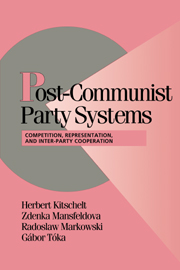Book contents
- Frontmatter
- Contents
- List of Figures and Tables
- Acknowledgments
- Introduction: Democracy and Party Competition
- Part I Theory: Party Systems and the Procedural Quality of Post-Communist Democracy
- Part II Setting and Research Strategy
- Part III The Structuring of Party Competition
- Part IV Political Alignments and Dimensions of Competition
- 7 Political Divides and Alignments: The Politicians' Perspective
- 8 Electoral Constituency Alignments: Emerging Political Cleavages?
- Part V Political Representation and the Quality of Democratic Governance
- Conclusion
- Appendix I List of Political Parties and Electoral Alliances
- Appendix II Questionnaire for the Elite Study
- Appendix III Population Survey Questions (Policy Opinions)
- Bibliography
- Index
- More Titles in the series
7 - Political Divides and Alignments: The Politicians' Perspective
Published online by Cambridge University Press: 05 June 2012
- Frontmatter
- Contents
- List of Figures and Tables
- Acknowledgments
- Introduction: Democracy and Party Competition
- Part I Theory: Party Systems and the Procedural Quality of Post-Communist Democracy
- Part II Setting and Research Strategy
- Part III The Structuring of Party Competition
- Part IV Political Alignments and Dimensions of Competition
- 7 Political Divides and Alignments: The Politicians' Perspective
- 8 Electoral Constituency Alignments: Emerging Political Cleavages?
- Part V Political Representation and the Quality of Democratic Governance
- Conclusion
- Appendix I List of Political Parties and Electoral Alliances
- Appendix II Questionnaire for the Elite Study
- Appendix III Population Survey Questions (Policy Opinions)
- Bibliography
- Index
- More Titles in the series
Summary
The failure of the socialist planned economy is likely to become a crystallizing agenda item in all post-communist countries where parties reach out to voters with more or less programmatic appeals. But beyond this baseline, historically diverse pathways, institutions, and power relations affect the extent to which economics shapes political divisions and the patterns according to which economic appeals relate to an agenda of socio-cultural politics. To recall the result of our theoretical argument in chapter 2 in the roughest approximation, we expect three constellations. After bureaucratic-authoritarian communism, with the Czech Republic as our reference case, we expect economic conflict over the extent of market liberalization to dominate the programmatic diversification of the electorally relevant parties, while other divisions are crosscutting and more or less irrelevant for party competition, although they may bind some constituencies to parties through mechanisms of voter identification on less salient issue dimensions. After nationalaccommodative communism with negotiated transition, socio-cultural divides play a much greater role for the emerging competitive party system. Such divides may crosscut economic-distributive conflict dimensions and at times be more important for political competition than the latter, particularly where all relevant parties, including the former communists, embrace essentials of a capitalist market economy. Our two empirical reference cases for variants of this configuration are Poland and Hungary. After patrimonial communism, finally, programmatic competition tends to be less crystallized, but the programmatic spectrum that is detectable divides parties over economic policy reform.
- Type
- Chapter
- Information
- Post-Communist Party SystemsCompetition, Representation, and Inter-Party Cooperation, pp. 223 - 261Publisher: Cambridge University PressPrint publication year: 1999



